 Petzlover
Petzlover Bohemian Shepherd is originated from Czech Republic but Chippiparai is originated from India. Bohemian Shepherd may grow 7 cm / 2 inches shorter than Chippiparai. Both Bohemian Shepherd and Chippiparai are having almost same weight. Both Bohemian Shepherd and Chippiparai has almost same life span. Both Bohemian Shepherd and Chippiparai has same litter size. Bohemian Shepherd requires Moderate Maintenance. But Chippiparai requires Low Maintenance
Bohemian Shepherd is originated from Czech Republic but Chippiparai is originated from India. Bohemian Shepherd may grow 7 cm / 2 inches shorter than Chippiparai. Both Bohemian Shepherd and Chippiparai are having almost same weight. Both Bohemian Shepherd and Chippiparai has almost same life span. Both Bohemian Shepherd and Chippiparai has same litter size. Bohemian Shepherd requires Moderate Maintenance. But Chippiparai requires Low Maintenance
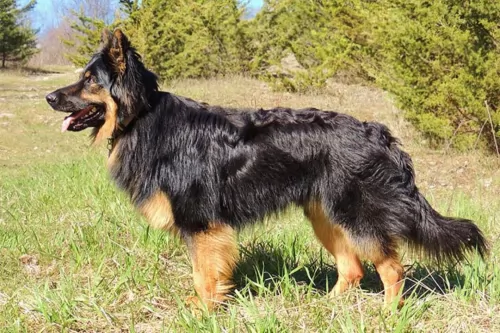 Known as the Chodský pes or the Chodenhund, the Bohemian Shepherd is native to the Czech Republic and is a herding breed. Like many other old dog breeds, nothing is 100% certain about is history. This is thought to be because the breed was developed centuries before the keeping of records. It is certain however, that the breed developed in the south-western portion of the Kingdom of Bohemia, which is now part of the Czech Republic.
Known as the Chodský pes or the Chodenhund, the Bohemian Shepherd is native to the Czech Republic and is a herding breed. Like many other old dog breeds, nothing is 100% certain about is history. This is thought to be because the breed was developed centuries before the keeping of records. It is certain however, that the breed developed in the south-western portion of the Kingdom of Bohemia, which is now part of the Czech Republic.
It is believed the Bohemian Shepherd came from herding dogs such as the Pinscher/Schnauzer, Spitzen or even a dog/wolf hybrid. It was in November 1991, that the Bohemian Shepherd Lover’s Club was founded. Many Bohemian Shepherd breeders have been registered and today the breed has earned the reputation for being a superb family dog. The dog has also been granted recognition with the Czech National Kennel Club.
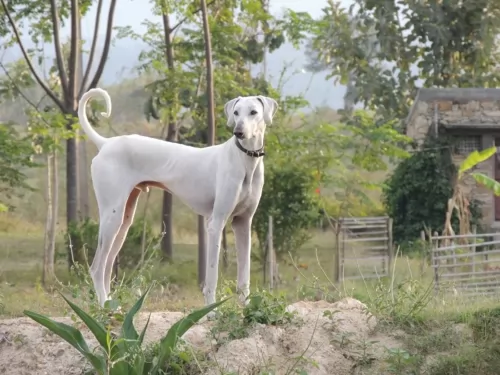 The Chippiparai is a working dog found in India and until recently there has been little interest in the purity of any breed, but rather only an emphasis on the abilities of the dog. They are only beginning to research the origin and history of their native dogs such as the Chippiparai. Not much is known about the origin of the breed except that it is found almost exclusively in Tamil Nadu and Keraia in the southern part of the subcontinent of India. Other than this there is much speculation about the breed’s origin but very little-known facts. It is indeed an ancient breed; however, its origin could be thousands of years ago or simply hundreds of years ago.
The Chippiparai is a working dog found in India and until recently there has been little interest in the purity of any breed, but rather only an emphasis on the abilities of the dog. They are only beginning to research the origin and history of their native dogs such as the Chippiparai. Not much is known about the origin of the breed except that it is found almost exclusively in Tamil Nadu and Keraia in the southern part of the subcontinent of India. Other than this there is much speculation about the breed’s origin but very little-known facts. It is indeed an ancient breed; however, its origin could be thousands of years ago or simply hundreds of years ago.
• Perhaps it is a descendant of the Saluki as it resembles this breed quite a bit. It has been believed for some time that the Saluki is the original sighthound and the source of all sighthound breeds. The Saluki was very popular in the Middle East, especially in Persia and Arabia from which it could easily have spread to India. It would then have been shared from Northern India to Southern India where the Chippiparai is found.
• Perhaps the Chippiparai is a descendent of sighthounds from Central Asia and Afghanistan – the Tazi, Taigan, Hortaya Borsaya or the Afghan Hound. This part of Central Asia had more trade, influence and contact with the Indian subcontinent early in their history than with any other region. The Chippiparai is considered by some to be more like these sighthounds than like the Saluki and the interaction between these regions has a much longer history than the Middle East and India.
• It is also speculated that the Chippiparai might have been developed completely and uniquely from the local street and working dogs. With the civilization of India being one of the oldest in the world, it is considered a possibility that the Chippiparai is the descendent of the Harappan hunting dogs that probably were developed by the Indus Valley or Harappa roiling class.
Wherever the Chippiparai came from, they were the exclusive property of the wealthy and ruling castes. These upper castes were the only ones that could legally hunt with dogs or afford to feed one. The royal classes of Tiruneivell, Thanjavur, and Madurai all fed the popularity of the breed among the upper castes. They were coursing dogs used to chase down the prey once it was sighted. The Chippiparai are incredibly fast runners and would catch almost any prey and either hold it or kill it for their hunter. The Chippiparai, when not hunting, had to be chained so they would not chase any small animal that they saw. This confinement also added to the purity of the breed as random breeding was prevented.
The southern part of the Indian subcontinent is extremely hot with routine temperatures over 100’. The Chippiparai was developed to withstand these extreme temperatures and is more heat tolerant than most any other breed. They also need very little food and are resistant to the many parasites and diseases found in southern India.
Harboring the belief that Indian dogs were not as good as European ones, the occupying countries of Portugal, France, and Britain, had no interest in the Chippiparai, again leaving the breed to develop naturally on their own with little or no interbreeding. They also received no formal recognition because Indian culture only valued the dog for its working abilities. There was no Indian Kennel Club until 1956.
The Chippiparai is now very rarely and only found in the area of its birth. Many believe the breed is in danger of becoming extinct and even though it is now registered with Indian Kennel Clubs it is not often shown in their dog shows. Lovers of the breed are now attempting to get Indians to recognize that the Chippiparai is a great companion animal and attempting to save the breed.
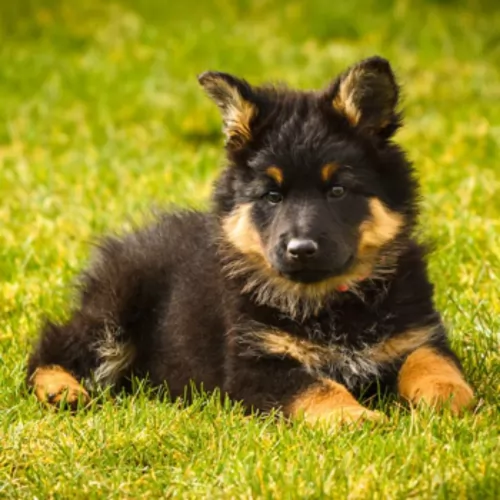 The medium sized Bohemian Shepherd looks much like a combination between the Collie and German Shepherd. He is 48-55 cm in height and weighs about 15-25 kg. The Bohemian Shepherd has a thick, long coat which is black and tan in color and with an undercoat, allowing him to cope in icy weather conditions. His well proportioned body is muscular and compact with a long bushy tail and erect ears.
The medium sized Bohemian Shepherd looks much like a combination between the Collie and German Shepherd. He is 48-55 cm in height and weighs about 15-25 kg. The Bohemian Shepherd has a thick, long coat which is black and tan in color and with an undercoat, allowing him to cope in icy weather conditions. His well proportioned body is muscular and compact with a long bushy tail and erect ears.
The Bohemian Shepherd makes a wonderful family pet, becoming very attached to his human family. He has a good reputation with children too and will get on well with other pets in the home. He is so amicable that he makes a good pet choice for those looking to own a dog for the first time.
He is intelligent and alert and also protective of his family, making him an excellent guard dog. He is easily trainable, and just like with any other dogs, will require training and socialization.
 The Chippiparai is a typical sighthound although their size and appearance will vary more than that of registered purebred sighthounds. Typically, they will have a long, domed head with small erect ears and dark eyes. Their muzzle will be as deep and wide as the skull but longer. Their legs are straight and long, their chest is roached back and deep, giving them, an appearance very similar to a greyhound or other sighthound.
The Chippiparai is a typical sighthound although their size and appearance will vary more than that of registered purebred sighthounds. Typically, they will have a long, domed head with small erect ears and dark eyes. Their muzzle will be as deep and wide as the skull but longer. Their legs are straight and long, their chest is roached back and deep, giving them, an appearance very similar to a greyhound or other sighthound.
They have a long curly tail, and their coat can vary greatly in color. They are medium sized, and their coat is short, shiny and close. He is very slender and sleek, which along with his long legs gives him that incredible speed. They are thin with visible ribs.
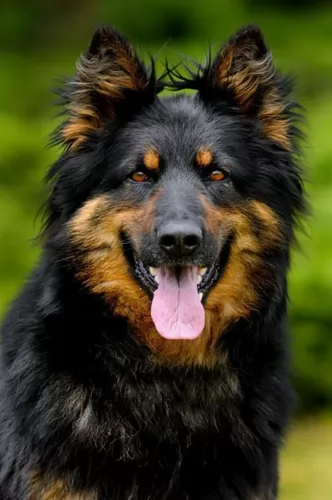 Playful by nature, friendly, gentle and co-operative, your Bohemian Shepherd will make a wonderful pet and he is a real social character, loving to spend lots of time with his human family. With minimal health conditions and without requiring much maintenance, he is an adaptable dog and will easily settle into city- or country living, so long as he is given regular exercise and attention.
Playful by nature, friendly, gentle and co-operative, your Bohemian Shepherd will make a wonderful pet and he is a real social character, loving to spend lots of time with his human family. With minimal health conditions and without requiring much maintenance, he is an adaptable dog and will easily settle into city- or country living, so long as he is given regular exercise and attention.
He is courageous and intelligent and also makes an excellent guard-dog. With so much going for this beautiful dog, he simply makes a loyal, loving and devoted family pet.
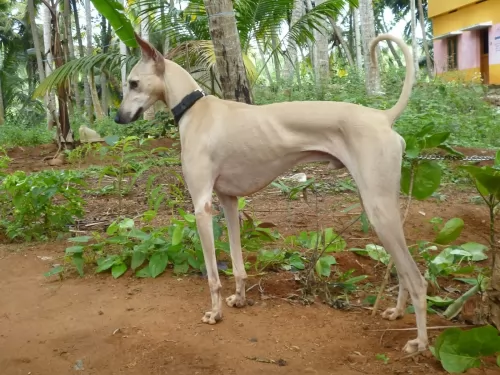 The Chippiparai is a loving, gentle family dog if well socialized, well trained and well exercised. They are very intelligent and need human companionship. Once they are living with a human family, they are very protective of that family. They are for the most part peaceful and quiet dogs. They are loyal and loving but they are not overly affectionate. Cuddlers they are not, and they do not like to play rough with children.
The Chippiparai is a loving, gentle family dog if well socialized, well trained and well exercised. They are very intelligent and need human companionship. Once they are living with a human family, they are very protective of that family. They are for the most part peaceful and quiet dogs. They are loyal and loving but they are not overly affectionate. Cuddlers they are not, and they do not like to play rough with children.
Accepting and loving within the family, the Chippiparai are equally hesitant and shy around strangers. They can be suspicious, but they are not aggressive. They are just very aloof with strangers, yet they hardly ever bark.
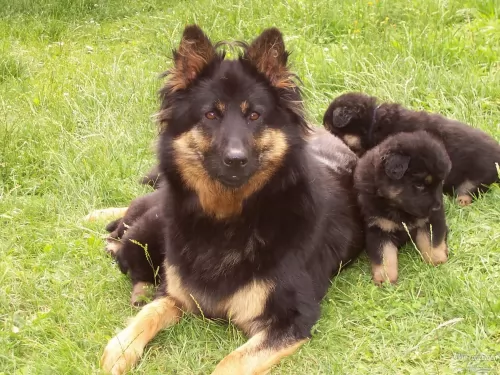 Breeding organizations are continually trying to minimize the diseases within limited-gene-pool dog breeds. While the Bohemian Shepherd is a generally health breed, there are diseases that are more common with the Bohemian Shepherd and which you need to be aware of -
Breeding organizations are continually trying to minimize the diseases within limited-gene-pool dog breeds. While the Bohemian Shepherd is a generally health breed, there are diseases that are more common with the Bohemian Shepherd and which you need to be aware of -
This is a painful disease – a problem with the formation of the hips – where the dog can develop arthritis and even become lame.
This is a condition where gas gets trapped in the stomach of your pet, so that he swells up, sometimes causing the stomach to twist. This is an emergency for your pet and it is extremely painful. Nobody really knows the cause, but when the gas is trapped inside the stomach, the bloated stomach of your pet requires you getting to the vet as quickly as you can.
Look out for Progressive Retinal Atrophy known as PRA . This is a group of degenerative diseases that affect the photoreceptor cells where the cells deteriorate and can result in blindness with your pet. Fortunately it isn’t a painful condition.
 There are no clinical studies regarding the health and health history of the Chippiparai, so little is known about their long-term health. However, most who know the breed, believe it is an incredibly healthy one. They seem to have a lot less genetically transmitted health issues than other purebreds. Because of their isolation for centuries in India, they have developed immunities and resistance to most parasites and diseases other dog suffer from.
There are no clinical studies regarding the health and health history of the Chippiparai, so little is known about their long-term health. However, most who know the breed, believe it is an incredibly healthy one. They seem to have a lot less genetically transmitted health issues than other purebreds. Because of their isolation for centuries in India, they have developed immunities and resistance to most parasites and diseases other dog suffer from.
Because of this you should look for the types of issues that occur in dogs of this size and build. Have them tested by the Canine Eye Registration Foundation and the Orthopedic Foundation for Animals.
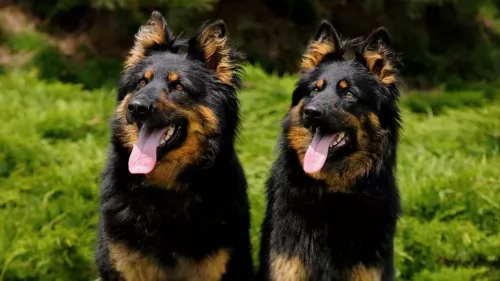 The Bohemian Shepherd is an energetic breed and will need to be exercised regularly. He’ll love to run alongside your bike on your cycling trips or you can take him on a long walk. Having said that, he is an easy going dog and can adapt to city- and country life, but if it’s city life, you can’t leave him cooped up in a small yard and think that will suffice. He has a personality that longs to be part of the family.
The Bohemian Shepherd is an energetic breed and will need to be exercised regularly. He’ll love to run alongside your bike on your cycling trips or you can take him on a long walk. Having said that, he is an easy going dog and can adapt to city- and country life, but if it’s city life, you can’t leave him cooped up in a small yard and think that will suffice. He has a personality that longs to be part of the family.
Your Bohemian Shepherd is a moderate shedder in spite of his thick beautiful coat. The coat will certainly need a good brushing at least twice a week to get rid of that loose hair. Not only that, your social Bohemian Shepherd will love the closeness to you that the brushing brings.
Keep his nails short and his teeth brushed at least 2 or 3 times a week to ensure there is no plaque build up. There are special toothbrushes and toothpastes made for dogs. Don’t use human toothpaste as the ingredients will be harmful to your pet.
Your Bohemian Shepherd, after one year of age, will eat one or two bowls of food a day. You’ll be able to tell what suits your dog, because the amount will eat about 2 to 4 cups of a good quality dry dog food a day, split into at least two meals. The amount can vary depending on its health, build, age, activity level and metabolism. Make sure it has access to water at all times and that it is changed as often as possible.
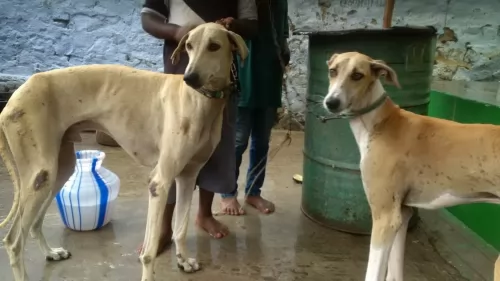 Do not overfeed your Chippiparai. Feed twice a day and no more than a total of 2.5 cups of high quality dry food.
Do not overfeed your Chippiparai. Feed twice a day and no more than a total of 2.5 cups of high quality dry food.
As mentioned previously the Chippiparai seems to have no genetic diseases or issues and very few acquired ones. However, he is sensitive to anesthesia and some foods. He is intolerant to cold weather and has a hard time with his pads on hard surfaces. Some Chippiparai might experience some of the ailments other breeds like them experience.
Both Elbow and hip are possible. This can cause arthritis and lameness. This occurs when the bone does not fit well into the joint.
This can cause lameness as well. The kneecaps slide over the knee instead of staying in place.
This is a hunting dog and he will want to hunt. They are incredibly fast and need the opportunity to run. Brisk walks will not be enough for this dog. He is very energetic. They will chase any small animals. It is not recommended that you have small pets even small dogs or cats with a Chippiparai. Having been bred for centuries to hunt, they are not likely to respond to any commands if they are off lease and chasing prey. Do not allow them to be off leash unless in a fenced area, and that fence needs to be 8 feet tall as they can easily jump a seven-foot fence. Try they at coursing, agility, fly ball and frisbee competitions.